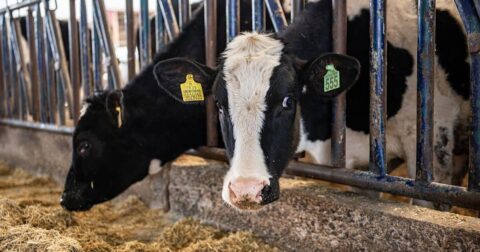Solutions
Plans to Curb Meat and Dairy Emissions Have a Deadline, and It’s Sooner Than You Think
Climate•6 min read
Reported
Reboot Food calls for replacing factory farms with precision fermentation.


Words by Jenny Splitter
The first week of COP27 has come and gone. The world’s most important climate conference dedicated an entire pavilion to the food sector this year. But the actual food system proposals so far are modest — a U.N. roadmap for agricultural emissions and a call for increased investments in adaptation.
Global leaders are unwilling to take on the livestock industry it seems, even though food-related emissions make up more than a quarter of all climate pollution, mostly from cattle farming — beef and dairy.
Perhaps that’s why a new environmental campaign chose this weekend — COP27’s Agriculture Day — to announce an ambitious food system proposal. Stop funding animal agriculture and start investing in alternative proteins and land restoration — to the tune of 2.5 percent of GDP over 10 years.
As climate scientists have made abundantly clear — the time for urgent action was yesterday, so the Reboot Food manifesto is appropriately ambitious.
Launched by scientists and environmental advocates, the manifesto proposes that governments pay farmers to rewild lands and invest in technologies that can transition livestock-based economies to plant-rich food systems. Lead author of the manifesto is Joel Scott-Halkes, former coordinator of Extinction Rebellion U.K. Co-authors include the environmentalist Mark Lynas and scientist Iida Ruishalme. George Monbiot is also a contributor.
The Reboot Food proposal doesn’t rest on the meat eaters of the world switching to lentils and pulses. Instead the report calls for major public investment in a technology called “precision fermentation.” As the report points out, it’s technology but it’s also been around for a very long time, used to make beer, rennet and even insulin.
Precision fermentation can also be used to brew yeasts and bacteria into plant-based and animal-free proteins. And it’s already on the market, albeit at a very small scale. There’s an ice cream company called Brave Robot that uses precision fermentation to brew the milk proteins into animal-free ice cream. Impossible Foods genetically engineered yeast to make its meaty-tasting heme ingredient for its plant-based burgers.
Several other companies are close to market-ready too — Meati, in Boulder Colorado, is using precision fermentation to make meat from mushrooms and a German-based startup called Formo is making cheese.
The size of the companies that use this technology are just a tiny fraction of the behemoth that is the global animal agriculture industry. Definitions of what constitutes a precision fermentation company vary to some degree but Reboot report author Joel Scott-Halkes figures the “meat industry is over 800 times bigger — or nearly three orders of magnitude.”
In other words, despite the urgent need for dietary change, precision fermentation is not going to displace beef and dairy at its current pace and rate of investment.
The Good Food Institute puts industry investment at just under $200 million last quarter. That’s a massive underinvestment for a climate technology that could potentially help the world meet the kinds of dietary change commitments researchers say are needed to limit global warming.
Reboot calls for governments to invest a lot more — 2.5 percent of GDP over 10 years towards food innovation, including precision fermentation, but also crop technologies like robotics and gene editing. Scaling up investment in precision fermentation would allow companies to be competitive with dairy and meat on price, taste and convenience, the three things research shows consumers care most about.
Though sales of plant-based meats have slowed recently, the overall growth of the sector shows plenty of people are willing to eat foods that rely on some amount of technology for a taste boost. Says Ruishalme, “studies show a lot of curiosity of a significant section of the population to at least want to try these products.”
Studies also show some percentage of consumers aren’t interested, says Ruishalme, adding “there are people not eager to try these new products, which is to be expected.”
Yet Ruishalme says precision fermentation may be able to avoid some of the challenges facing cell-cultured meat, which “can be more demanding and harder to scale up than microbial fermentation.” Leaning heavily into the food science of brewing proteins, much like beer or soy sauce, may help commercialize these products in a way that highlights their familiarness.
Right now, the planet needs paths for producing enough food to feed a growing population — almost 10 billion by 2050 — without cutting down more rainforest or other wild landscapes that can keep carbon out of the atmosphere.
At scale, precision fermentation could save a massive amount of land. The Reboot Food report calculates the technology has the potential to “produce the entire world’s protein requirements on just 420km2 — an area of land smaller than Greater London.” It would also require fewer pesticides and water use.
Change in the way we grow and produce food at this scale would undoubtedly be complicated and challenging, especially for farmers and workers.
That’s why governments have to do more than just remove subsidies for animal farming, says report co-author Iida Ruishalme. “We advocate for policies that pay farmers for environmental services, a system similar to one already in place in Costa Rica,” she says, citing conservation efforts that paid farmers for conservation to combat deforestation.
“We should facilitate the transition by offering farmers the choice of enrolling in a program that pays them for things like reforestation,” Ruishalme says, “supporting carbon-rich and biodiverse ecosystems on their lands.”
The report also sees a future in which precision fermentation reaches a wider range of communities. “Change should never come at the cost of food security,” says Ruishalme. “Instead, these new technologies should be made available to facilitate the adoption for communities that see them as desirable.”
But the potential is there. Ruishalme adds: “Scaled up, precision fermentation can become an attractive and cheap source of food that produces the nutrients people are already familiar with in a way that uses far less resources.”
Claire Hamlett contributed reporting for this story.
This piece has been updated to distinguish cell-cultured meat from precision fermentation.